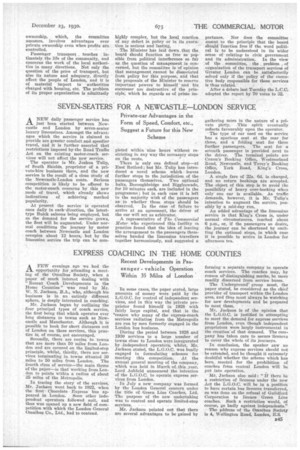SEVEN-SEATERS FOR A NEWCASTLE-LONDON SERVICE
Page 59

If you've noticed an error in this article please click here to report it so we can fix it.
Private-car Advantages in the Form of Speed, Comfort, etc., Suggest a Future for this New Scheme ANEW daily passenger service has just been started between Newcastle and London by seven-seater luxury limousines. Amongst the advantages which the service is claimed to provide are greater comfort and speedier travel, and it is further asserted that restrictions imposed by the Road Traffic Act on the existing motor-coach services will not affect the new service.
The operator is Mr. Joshua Tulip, of South Shields, proprietor of a private-hire business there, and the new service is the result of a close study of the Newcastle-London route. Serious competition is likely to be offered to the motor-coach concerns by this new mode of travel, which already shows indications of achieving marked popularity.
At present the service is operated once daily in each-direction, the latesttype Buick saloons being employed, but as the demand for the service grows, the fleet will be augmented. Under normal conditions the journey by motor coach between Newcastle and London occupies about 12 hours, but by the limousine service the trip can be cora
plated within nine hours without restricting in any way the necessary stops ' On the route. •
There is only one defined stop—at East Retford; but Mr. Tulip has introduced a novel scheme which leaves further stops to the jurisdiction of the passengers themselves. Two optional halts, Boroughbridge and Biggleswade, for 10 minutes each, are included in the programme ; but in each case it is left to the majority wish of the passengers as to .whether these stops should be
observed. In the case of failure to arrive at an agreement, the driver of the car will act as arbitrator.
A representative of The Commercial Motor who experienced this facility in practice found that the idea of leaving the arrangement to the passengers themselves banded the limousine travellers together harmoniously, and suggested a gathering mbre in the nature of a private party. This spirit eventually reflects favourably upon the operator.
The type of car used on the service has a spacious seat at the rear for three, and a folding seat for three further passengers. The seat for a seventh passenger is provided next to the' driver. The terminal points are Coxon's Booking Office, Westmorland Road, Newcastle, and Tovey's Booking Office, York Road, King's Cross, London.
• A single fare of =s. 6d. is charged, and no return bookings are accepted. The object of this step is to avoid the possibility of heavy over-booking when only' one car is available. As traffic demands, however, it is Mr. Tulip's intention to augment the service, possibly by a mid-day run.
An added advantage of the limousine service is that King's Cross is, under normal circumstances, reached about 6 p.m., or, if the passengers SO desire. the journey can be shortened by omitting the optional stops, in which case it is possible to arrive in London for afternoon tea.




























































































